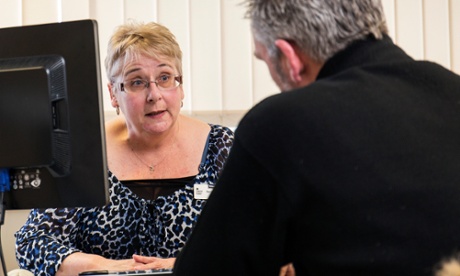A Lords committee has urged the government to make permanent an increase in the value of universal credit benefits to address poverty and job losses triggered by the coronavirus pandemic.
In a report calling for a “new deal” for jobs to prevent a surge in unemployment next year, the Lords economic affairs committee said there was an urgent need to reform the benefits system and make additional plans for job creation.
Calling on the chancellor, Rishi Sunak, to shift spending away from emergency wage subsidies, the committee said the government should focus on creating job opportunities for people who are most at risk of unemployment.
It said the temporary £20 a week increase in universal credit made by the chancellor at the outset of the pandemic in March, which is due to end in April, should be made permanent.
Lord Forsyth of Drumlean, the committee chair, said it was “obvious” the government would have to address the universal credit issue. “Otherwise they are going to have several other famous footballers running campaigns,” Forsyth said, in a reference to the lobbying from Manchester United’s Marcus Rashford for free school meals.
The committee’s intervention is likely to pile pressure on the government after warnings from experts that failure to change course would drive up poverty levels. Ending the increase would leave as many as 6 million poor households £1,000 a year worse off at a time of intense economic disruption.
Official figures are expected to confirm on Tuesday that unemployment in the UK rose above 5% for the first time since 2016 during the three months to October, before the government committed to extending the furlough scheme until March. The jobless rate is expected to peak at about 7.5% next summer, equating to as many as 2.6 million people unemployed, as the furlough scheme is scaled back.
The Lords committee, which is responsible for holding the Treasury to account, said additional government support was needed to create jobs next year as the system of wage subsidies comes to an end.
“This means creating jobs to repair the UK’s ‘social infrastructure’, the urgency of which has been exposed during the Covid-19 pandemic, by increasing the number of social care workers and investing in the childcare sector. It means prioritising sustainable infrastructure projects that can be delivered at scale, quickly, and across the whole of the UK,” the committee said.
Ministers should launch a new “jobs, skills and training guarantee” for every young person not in full-time education or work for one year, according to the report, which also called for the government to step up plans for protecting jobs and helping people to improve their skills.
Forsyth said the government had given the impression that the economic crisis would be short-lived and “everything will be fine by spring” as Covid vaccines become available. However, he said the government was “sleepwalking into an unemployment crisis” as restrictions remained in place and job losses continued to rise.
“Rishi Sunak has done his winter economic plan. He needs another for the spring or he will have a big unemployment problem. He needs to get ahead of the curve,” he said. “What this report is trying to do is get the government to wake up and have a plan.”
Forsyth said the committee thought skills and training should have been part of the furlough scheme, and he was “disappointed “ the chancellor had not made the temporary increase in universal credit permanent.
“There are 5 million people on universal credit and more job losses coming in the new year. This is something that needs to be addressed.”












